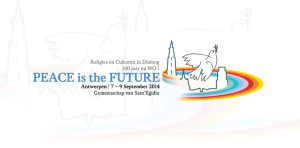
By Sarah Mac Donald - 03 September, 2014
 Religious leaders from all the major faiths as well as some political leaders are set to address the Community of Sant’Egidio’s ‘Peace is the Future’ conference next week in Antwerp.
Religious leaders from all the major faiths as well as some political leaders are set to address the Community of Sant’Egidio’s ‘Peace is the Future’ conference next week in Antwerp.
Between 7-9 September, religions and cultures will dialogue against the backdrop of the centenary of the First World War.
Organisers say the choice of location is linked to the anniversary of the “tragic conflict that spilt blood over Europe”.
The aim of the gathering is to bring together the “spirit of Assisi” and the commitment to “keep the lamp of hope alight, praying and working for peace”, as Pope Francis said in an audience at the Rome Meeting on 30 September 2013.
The Antwerp gathering aims to meet the growing need for dialogue on peace.
According to organisers, it is not intended to circumvent a necessary reflection on contemporary crises, such as the persecution of Christians, and on the risk of a religious justification for violence.
The conference will focus attention on conflicts and the ongoing international tensions, as well as the responsibility of religions and people of good will to build a united world in which to grow a culture of tolerance and life.
It will also address issues such as sustainable development, immigration, poverty, education for peace, martyrdom in the present time, violence of religious origin, Christian unity, and dialogue with Islam.
Along with personalities from the Catholic world, representatives of the newly elected European institutions as well as representatives of culture and interreligious dialogue will participate.
At the Opening Assembly on Sunday 7 September the keynote address will be given by Herman Van Rompuy, President of the European Council.
Other contributors will include Vian Dakheel, a member of the Iraqi parliament and the Yazidi community; Ignatius Aphrem II, Syrian Orthodox Patriarch of Antioch and All the East; Rabbi Abraham Skorka of Argentina who is a personal friends of the Pope’s; Shawki Ibrahim Abdel-Karim Allam, Grand Mufti of the Arab Republic of Egypt; Gijun Sugitani, Supreme Advisor of Tendai Buddhist Denomination in Japan.
The Sant’Egidio Community was founded by Andrea Riccardi in 1968. It promotes international peace and service of the poor and has a centre at St Paul’s Church, Arran Quay, Dublin.
The Community is credited with brokering peace in Mozambique after a 16-year war. They were also involved in trying to end conflicts in Guatemala, Albania, Rwanda, Berundi, Algeria, Sudan, Angola, and Northern Ireland.
In 1995, also, they were nominated for the Nobel Peace prize.
Their pastoral work in Rome also includes caring for AIDS patients, visiting the terminally ill, campaigning for better conditions for the elderly, educating the poor, and assisting them acquire housing and jobs.
At one centre alone in Travestere they serve 1,500 meals a day to emigrants, the homeless, and refugees, and run hostels for those in need of accommodation.
St Egidio’s spirituality and principles:
– prayer is central to the overall direction of community life;
– communicating the gospel, the heart of the life of the community, which extends to all those who seek and ask for a meaning for their life;
– solidarity with the poor, lived as a voluntary and free service, in the evangelical spirit of a Church that is the “Church for all and particularly the poor” (Pope John XXIII);
– ecumenism, lived as a friendship, prayer and search for unity among Christians of the whole world;
– dialogue recommended by Vatican II as a way of peace and co-operation among the religions, and also a way of life and as a means of resolving conflicts.